What's going on?
3 weeks until school is done. For this year at least.
You're at my personal blog. I cover lots of my interests here.
Stuff that came up for classes:
1. Classmate said libraries shouldn't try new things. Response by me:
" Libraries still matter and how they embrace change really matters. There is a whole host of research coming about the "library as place" as an "information commons" as a "social/cultural/civic/media center for community" as a "culture of participation" -it's an exciting time for libraries that realize the needs are many, the places few, and the reason to change (and change quickly) is to remain relevant. Many cities, counties, universities and colleges have closed the doors and gutted a part of their soul: the library, for libraries were seen as useless, dusty stacks taking up a square foot of space (any true administrator thinks in cost per square foot and how to maximize this.) Libraries must find new ways to add value. The one great thing about libraries is that they can change -while still meeting current needs."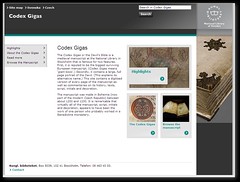
2. In Europe, they showcase the Devil's Bible. Here we ban books and consider a folk tale book obscene. Fortunately, they're are some sane people in the town who actually recommend reading banned books. Read some more thoughts on it.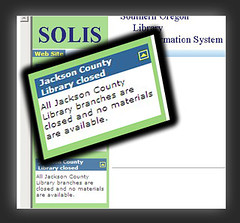
3. Leadership is about preventing things that should not happen. While it's a leap and I don't know all the facts and yes I'm getting into the game late but how is it that we do not have a network that any library or library system can tap into for emergency help?
Far-fetched? Let met tell about this place that gives you things for free allowing you to get rich and even when you return them, you're still richer. Crazy right? What kind of world are we living when we let a little piece of ourselves die quietly? Where's the net to catch the weak; where are the strong and passionate to rally round the fallen, where was I when the last book drop was locked?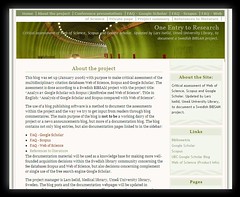
4. Oh how I love to teach the lazy, the I don't care the too--busy researcher and the deeply thorough researcher about ways to mine citation data. I also like to learn myself about the accuracy and efficiency of WoS, Google Scholar, and Scopus.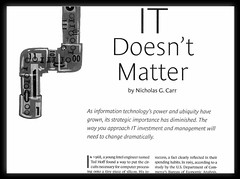
5. IT don't matter! or does it for libraries? Next up, the greatest use libraries can make of technology is the strategic use of IT. Don't just buy more "Internet terminals" rather make technology your b....[deletes derogatory word]...most beneficial tool.
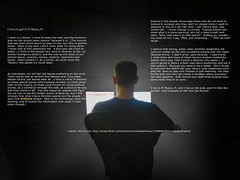
this is meme.
I live on gulf in Ft Myers, Fl.
I work in a library. I work to make the web, and the technologies we can access seem natural -because it is. (The present web has tools which aren't so easy to use; but they're getting better. Most of the time I don’t know what I’m doing either. I mean look at this photoshop file. A five-year old could do better.) I think of the people who work in libraries as the collective intelligence (brain), and the web as this body of connective fascia, muscles, nerves, tendons, ligaments and bones. Brain+brawn=? As a whole, we could move the "library" into places it's never been.
As individuals, we will feel like leaves scattering on the wind. That’s not so bad as Jennimi and Melissa and I hug trees. Maybe we are just leaves after all. I have a vision of libraries as these special places where people connect, as these great halls of free inquiry, as these local forums for social/political events, as a connector through the web, as a place to be lazy and chat online or off. I've only begun to venture into figuring out how to tap the hidden power of libraries; but I feel strongly that what makes libraries special are the people. I work with brilliant people. Next is the technology, then the building, and of course the information (not really in that order though.)
Believe in the people. Encourage those who do not want to believe to uncover why they don't or, please move I want to advance in line so I can ride next. I am "library feet, web inches tall." I know change is coming. Change always sits down after it is done working, lets out a deep breath and says, "Now, that wasn't so bad was it?" Getting up, wondering what hit me, I say, "Nah, just surprising..." Then we both laugh.
I believe that strong, quiet, clear, dynamic leadership will come to matter as the only consistent actions that can make libraries thrive. I didn't write: save libraries. I said thrive. I meet more and more of these movers-shakers-bailiwicks-bakers every day. (Yes I know a librarian who bakes.) If you're going to library school read about leadership and put it into practice. Because you need to be a leader. Don't forget to welcome the WWW into your library, your leadership style and life; learn to play nice instead of just watching. You may be the only one who can create a sandbox where everyone can play together. And remind your staff what purpose they serve while they're at work.
I live in Ft Myers, Fl, and I live on the web, and I'm Ron Burgundy? and congrats on the new job Rachel!
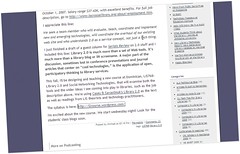
Holy Shnikes you know you want to take this class
Originally uploaded by iblee....
Have you seen this?
http://l2course.wordpress.com/
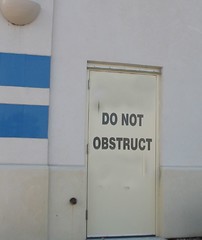
Note: Thanks to a fantastic proofreader, my friend Marla, this blog is proofed!
Why could this post help you? Because you can tell me other things I need to remember to develop as we go back to school this fall.
You're in school as XXX student? How can you get out of school alive? Should you just hunker down and get it over with? How can you get out of school and get a j-o-b, or get some Work, or have a "career"? How will you matter? What are the things you need to think about as you go to school besides when your assignments are due? What are the skills you should develop? Where can you be most effective? How can you change the "thems, the theys, the those people" because you have the answers? What are you going to library school for: to usher in what's coming after 2.0 or to maintain the status quo? How can you be better, at changing?
Don't worry if I sound completely wrong. I most likely am in some way. I'd like to hear about it too.
On emotional intelligence: This will make some of you feel uncomfortable (and if it's any comfort this is coming from an "ENTP" -if classifications help you.) You're first guideline: Do not obstruct or obfuscate. Your technological skill set will matter little if you show a co-worker no compassion when they breakdown in front of you in absolute despair and sadness because they just lost someone they love. So what if they're a co-worker you don't really know (which begs the question why we're not closer to the people we spend nearly all of our waking hours with...hmmmm, does "blank" keep you from expressing your humanity at work because it's feared to affect productivity? What would you do to comfort someone? Why even talk about emotions at work? If you haven't thought about the fact that we all face death and loss, that in the smallest of moments you can find the deepest well of humanity you will not be successful in bringing any change to the library world. The library world will make you feel the entire spectrum of human emotions. Let your emotions help you. We are not rational beings. We are a combination of rationality and extreme irrationality. This is fine. To be successful in your work/school/life you must deeply develop emotional intelligence. I'm not saying: become a sap. Yet, when was the last time you even had a conversation about your emotions, or feelings, or allowed yourself to ponder on thoughts about your emotions or anything about any nagging mental conditions that run like an endless-looping-script in your head? Can technological skills be learned much more quickly than you can learn to change ingrained, reactionary, feeling-based responses? Take the long way out. Leave the quick-witted path. Coddle anger like you would rock a newborn baby to sleep (because anger's really just a big, big baby who needs a nap.) Find the middle ground between technology and humanity.
Try this: for the next week give up all spontaneous reactions to someone cutting you off while driving, a colleague interrupting you, a patron telling you they know you have that book with the thing about the man who knew too much, etc...note how hard it is to not react negatively to comments, posts, or pictures, or experiences that do not fit how you think things should go. And read "The No-Asshole Rule" by Sutton.
For your in-class sessions: develop a consensus-building methodology rather a militaristic posturing of fortifying your own opinions. Lively, engaged dialogs I have no problem with. Class discussions are not about advancing your best arguments as you would to win on some battlefield. Instead of advancing your own opinions in class seek out an opinion you must take time to assimilate as your own. Then, in doing so you will learn a few key things about yourself while developing the ability to view ideas from another student's perspective. Years from now when you are sitting in a meeting and someone is putting forth an absolute insane idea, you may be able to find some merit in it. Or you may be able to gracefully help them see the error in it. The goal of seeing into your own preferences, beliefs, attitudes, or mental habits should be quite exhilarating -yet I bet you sense resistance in your own mind as you read this. Why is that? I do too. Hmmm, maybe it's bullshit. Maybe I need to try harder.
Try this: Pick a person to understand and work to explore their view point. If you wish to be so bold, take on a view that is diametrically opposed to yours. Adopt it as your own and work on gaining an insight that causes "ah-ha!" Then, tell me how you did it.
Seek out mentors: I (thankfully) have several. Some are informal and I call/email/im irregularly. Or have one you meet on a weekly basis and just talk about life and what-ifs. One of the biggest things you can do with your mentors is "thought experiments." Mentors most likely have traits or skills or life experiences you have not had yet. Therefore draw on them.
Try this: often I get frustrated in meetings when there is no process; often those meetings are just a crazy melee. Hashing this out with one of my mentors I developed a strategy: abandon all outcomes while maintaining hope. Good luck! ...as I don't have that one figured out at all. I just know how to notice the rising feeling of frustration now. When that feeling passes, I can cultivate some pretty cool ideas. Usually they're still hot as potatoes outta the microwave which I end up lobbing at my friends but hey, I am definitely imperfect.
Think: how would I teach this? Michael Stephens, Roy Tennant, Jessamyn West (and others I've discovered through blogging like Penelope Trunk) so distinctly embody what I consider master-students/teachers that sometimes you don't even realize how much and how often you're learning when you're talking with them or just reading something they wrote or meandering down their flickr streams. So, why does someone else think they are right? What is the middle ground I can reach? How can I bridge this information into a discipline that no one else is thinking about? I once found a cartoon about mine workers in
Consider yourself a reader who is a leader: Read. A lot. Mostly about leadership but be very skeptical of trends, management-ish, cutie-tootie-happy-bunny-pony-titles. Take a bite o' time to assimilate. Chew thoroughly but don't eat so slow you starve. Have a process. In the book "Love is the killer App", Tim Sanders outlines how to virally spread your knowledge & gives some pretty sweet techniques for getting more out of your reading. Consider it like this, when you teach you're kinda hacking your own learning centers forging new connections thereby accelerating everyone’s ability to learn. The plasticity of our brains is so far greater than our ability to deny what we can't learn. Also, find someone who you think exemplifies leadership and find out what they studied. In "Leading quietly" Badaracco's examples are so clearly articulated you'd have to try NOT to learn from them.
While we're talking about learning: learn to pause while you're moving. I mean that (kinda) metaphorically. Moments strung together like so many disjointed vignettes are all we have. Many people far smarter than me consistently point this out. Schon's "The Reflective Practitioner" delivers a good treatise on this. Flow" by Csikszentmihalyi (Chick-sent-me-high) helps to you to see this in every activity. Hannaford's "Smart Moves: why all learning is not in your head" presents powerful ways to up-your-engagement as you learn. "Living in Balance" by Levey and Levey bursts with methods to put into action the idea of balance -which is what learning is all about. Taking Aikido wouldn't hurt either. Or Ashtanga. Or having a dog.
Become an auto-didactic: if you're not already, you need to be. This is your primus inter pares requirement for entry in the library/information professions. You should be on the bleeding edge, the event horizon, the rising tide, the perfectly tensioned state of always looking for opportunities to be learning. Have you seen The Last Mimzy? I did. [sniff sniff]
On advice and mistakes: I don't know much. I screw more things up than I fix them. I break a lot of things. I probably take too many risks. I'm not routine enough and need to proofread better. I respond too quickly. My aim lies for a shot down the middle and I'm the guy that ends of beaming someone in parking lot with a stray golf ball. But, I'm getting more and more comfortable with sticking my neck out and school is really the best place for it. Now, it may be to extreme for you to get an F because you wanted to do a project your way and really wanted to see if you professor was serious about accepting an original solution. It wasn't for me. I'm not paying lip service to taking risks. I've got a scatter shot of grades to prove I'm wiling to take risks and that this ain't just talk in case you’re wondering how far I'm willing to stick my neck out. (I would obviously prefer not to get Fs and I'm not suggesting you do it, nor am I bragging about getting bad grades because I think I'm soooooo cool.)
Develop discipline: you no doubt already have it. Take working out to start with. Most people say they don't have time to work out in school. Yet, you have time for all kinds of other habits right? Well, the first step of successful discipline is finding time. The second step is making time (which may be the first step?) The third step is using that time. The fourth step's letting nothing take that time away. The fifth step is repetition. The sixth is picking the right kind of workout. Are you training to relieve stress or compete in the Olympics? Devise the right program and you will find that you have resolute discipline. Training your body isn't about training your body, it's about training your mind. All the extreme religious ascetic practices use the body to train the mind. I don't agree on going to the extreme by the way. Sometimes though, when you start, a 100-mile run seems extreme. Once you realize that you're de-hardening habits and working to create a supple mind/body, then it's easy. Just joking. It's still work but at least you get the connection. Supple's better.
Working towards getting a j-o-b: if you're not already working in a library or some information-related profession you need to be. The people and blogs who tell you to not enter the library profession because there are no jobs are viciously blind, sadly misguided, disgruntled only because they have not continued to look for and may lack the skills to get a job. I'm not talking about the actual degree. There are other more intangible things you must build up within yourself. Yet, if you already are not working on your resume, your interview skills, an area of expertise, not blogging (or some activity that makes you process), not attending job fairs, not networking, not developing your career like any other passionate interest you have: then you will have very hard time finding a job let alone work you love. Yes, you should love your work because outside of sleeping it's the activity you are going to do for a very very very very very very long time. Accept this notion until you win the lottery at least. You also should have no compromises about the work you want to do. Getting a masters degree then working at, ohhhhh I don't know, a convenience store means you're not thinking about your choices long enough. Believe me: when someone is flinging verbal pooh at you in a restaurant, and you know you deserve better, it's one of the most disheartening feelings you can have at the end of 13-hour day. Don't get stuck being frustrated by your job like I did. Be far more awake than I was/I am as you go to school.
Remember, above all else: please, please, please come into this profession as a leader. Yes, embrace technology. Embrace change. Bring more of yourself to work while giving other people more space to be themselves at work. Embrace new ideas and create a sandbox for people to play in. Use language that includes people. Say yes first. Offer help first. Ask why not first. Help ideas succeed first. Let things happen even if you don't believe in them. How do you know what to believe in? Don't look to me to tell you that (like you were anyway?) Libraries and librarians no longer are a place of refuge from the world. You can't hide out in libraries as the world gets crazier. We need more "radical" libraries and librarians. We need less people getting out of the box and more people getting back into the right box. Read "Get Back in the Box" by Rushkoff. Libraries may well appear to be the calm center in this hurricane age of change. But, how do you know it's not really a tsunami and you're sitting on the shore -facing the wrong direction about to get slammed? Better to paddle out and ride in with the waves. We need leaders, like you, who will do nothing short of working to re-ignite the sleeping masses that rely on you so much. You may have to re-invent yourself along with the world of libraries to do this utterly hopeless, lifelong, and thankless task. Ready to go back to school now?
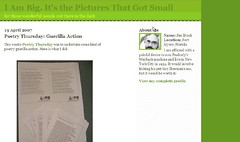
Got this link sent by a co-worker.
Poetry Thursday: Guerrilla Action
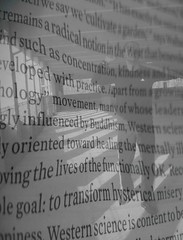
Find out how the other half is preparing.
[I'm breaking my rule of one-off posts. Rules are meant to be broken, right?]
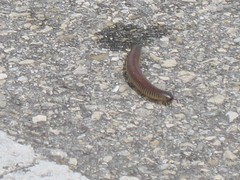
I look for humanity's need to be social as it's tied to technology in the information world, especially the way libraries could become significantly more important in so many peoples' lives in so many simple ways. It's not that libraries can't adapt, it's often that people won't adopt new ways of being without realizing they don't have to change.
Some neat stuff out there; these entries highlight how the online/off line world is becoming seamless through conversations, wireless, and age-old art of finding connections. Like "...Can we not be very excited about the cool Web-based applications that emerge each day ..." And the people who are "...Reading A Measure of Faith, by Maxine Billings . She bought it where she buys all of her books...She goes about twice a month and buys about fifteen or twenty books--black authors, historical fiction, erotica. Yes, you can buy erotica at Walmart...." or when you read this post, think about the design of anything in a library ; actually, think about something you really like in library buildings and see if you can name 5 points about what's wrong with what you like -that's right, not what you think is right about it but, what is wrong with what you like.
How do you do outreach?
-half-page weekly advertisement in student newspaper or any newspaper
-guerrilla marketing tactics to frats & sororities & Kiwanis & Rotary & Mad Hatters
-embedded librarians in various places besides libraries from 11-1 every day
Be open my library friends.
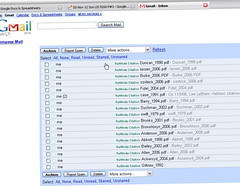
The idea:
Use RefWorks to manage citations & gmail as web database to collect research documents (articles, images, scanned pages from books, etc...).
The system can do this because we separate the documents from their descriptive identifiers:
--gmail to contain pdfs, and
--Refworks to hold citations.
Goals:
-- augment, unify, improvise new elements,
-- and adapt the best ideas in each design,
-- share, share, share: the golden days of the lone researcher are done -if they ever truly existed.
The major problem with current systems:
-- the continuing explosion of research, worldwide,
-- inconsistency in design and execution,
-- the different "export" formats for data with no standardized xml-like structure, (even if they say they do, it's rare to not have to clean up your data),
-- and lack of centralized storage mediums for collected documents in any format,
-- very few user advocates.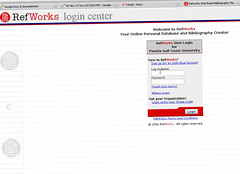
A Proposal for a Distributed Citation Management Information System: CMIS:
That's just some fancy name/acronym that uses web resources to make aggregated citations & digitized documents available anywhere & shareable. Here we look at the information system in terms of its usage, intended audience and features. The information system described below capitalizes on currently existing designs and technologies in information systems. I've not come up with anything new here: just re-mixed some ideas already out there. I know some systems offer this service, kinda.
Specific Process:
1.1 Our intrepid researcher conducts a search in a full-text-database or on the internet.
1.2 As the researcher finds citations & collects the full-text documents, those items could be stored remotely.
1.1a. The researcher could upload this file into a web-based storage medium. This web-based storage medium could serve triple duty
-- as a repository for the files,
-- as a means to back up files as we all face the potential of local, catastrophic data loss,
-- as a means to keep accessible/feed the collected citations and documents -think rss.
1.3 The researcher chooses RefWorks to manage the citations as it’s web-based & allows for semi-clean exporting.
1.3a. The researcher opens a gmail account with the name: Smith.documents@gmail.com
1.4 Next, the researcher renames the full-text pdf with this specific naming convention:
--"Last Name of Author Year.pdf" and uploads to gmail
1.4a. A researcher collecting thousands of articles, naming files arbitrarily or using the article title or using keywords and having to remember what they signify fails at a large a scale of documents.
1.4b. Adhering to a strict format encourages a consistent file naming structure and the use of a search engine to find the articles in a time of need. Browsing through nested folders on a personal computer could be likened to “filunacy” not to mention abysmally time wasting. Having to remember why you titled a file "Information Management" when it is about Florida Citrus in the 1930's may not make sense. Yet, if you use an information strategy combined with a search document repository where you properly cited and included metadata you might find that in an article from the 1903’s on citrus a quote that caught your attention and succinctly expressed how all the world is information -even in the eyes of a citrus farmer. 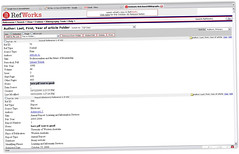
These two elements combined create a (web-based) citation manager and (web-based) document repository. Removing the need for storage on a personal computer
-- frees one to gain access to research anywhere in world,
-- allows anyone to share their research by encouraging soft collaboration.
Soft collaboration could mean an RSS feed to stream new research back into the library's OPAC or databases. This means a researcher could choose to be shown research other collected citation "containers" from fellow researchers via a feedback into a database.
The containers may have research citations of interest to anyone collecting similar research. Potentially another researcher could have already spent hours collecting documents on say, "Design of Information Systems." Seeing those citation containers collected along with a scholar's ongoing search will address the questions Tague-Suttcliffe and Saracevic put forth about interactivity retrieval and the need to not ignore this integration into search.
What this allows is a highly scalable design of simplicity, usability and the most important "small, low rules for learnability." Students will learn:
-- research is cumulative,
-- can be re-cycled, and
-- planning out research saves time at the end.
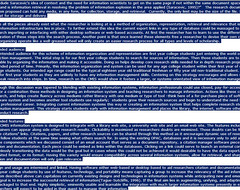
As OPACS and other online search systems become "smart" to
--allow users to contribute,
--make data portable across systems,
--and expose empty, disjointed spaces rather than disallow actions
the integration with much larger information systems (think web of interconnected citations) presently in existence or to be created in the future will increase collaboration. While the parts are not highly integrated into one web-based platform, we do have portability and opt-out abilities in some systems. A universal citation format for all disciplines/ document types wouldn't hurt either.
Design and usage:
Several citation collection systems exist. Most of the current systems have one component of what is addressed below. As an example, current citation management systems will keep citations organized but not the documents they describe. This is not to mention another issue where the researcher gets little help in the pragmatics:
--naming files,
--creating folders
--or instruction the best way to organize the collected documents.
If these current systems capitalized on the research of information organization perhaps the realization of aiding the researcher or defaulting to a "safe mode" would be transparent. Actual, practical aid to researchers on these matters is slim.
Current systems:
-- are either web accessible from any computer
-- or only accessible from a single desktop computer, and are
-- rarely both.
This is of no aid to researchers who wish to share their knowledge. The personal citation systems typically link to the articles stored locally on a personal computer and do not have a universal, off-site repository for the documents they describe. Buckland describes a document as something that will constantly evolve AND of which new forms may be introduced AND most importantly can serve as a sign to relate meaning. Usually though we find a document having a dual nature depending on its context (Buckland, 1997). The Shibboleth project & a central repository for uploading documents would go very, very far in aiding research. The OCLC is working on something like this for ILL.
This dude Saracevic's idea of context and the need for information scientists to get on the same page if not within the same document space rings true: gonnnnnnnnnnnnnnng. Saracevic asks, "How successful was and is information retrieval in resolving the problem of information explosion in the area applied (Saracevic, 1995)?” The research documents I'm choosing to discuss here are pdfs file formats. The collection system proposed can hold any media, in any form, for collection, storage, and retrieval. Currently, the only limit may be the size of the file. Some materials may need to be converted to a suitable electronic format for storage and delivery.
Since all the pieces already exist what the researcher is looking at is a method of organization, representation, retrieval and relevance that is highly achievable. Being part of larger organization systems much of the information infrastructure lies in place. To further extend this idea the current export links in any type of database could be massaged to externally or internally launch a container to capture the scholar's research importing or interfacing with either desktop software or web-based accounts. At first the researcher has to learn to use the different elements.
Future iterations of this information design will see the integration of these steps into the search process. Another point is that once learned these elements free a researcher to devise their own citation system or use existing systems. Making searching, collecting, and organizing operate like a well-greased wheel will only create an easier research process for all types and levels of scholarship.
Intended audience:
Our intended audience for this scheme of information organization and representation are first year college students just entering the world of research. The idea is to break research into two steps: search and collection management. The initial step is for our first year college students to search for sources of information. Then those students are to manage the collected sources of research to make it immediately valuable by organizing the information and making it accessible. Doing so helps develop core research skills needed for in depth research projects such as the ability to manage large pieces of information over an extended period of time.
Primarily, this information organization and system can be used for any age college student within their first year of college. The immediate focus is freshman, first year, or first time in college students. Our intended age range could be the typical eighteen year old traditional freshman or fifty year old non-traditional student. The best results and sustained use will come from marketing towards and for first year students as they are unlikely to have any information management skills. Centering on this strategy encourages and allows student to learn proper sequence for research and teaches students to break research into steps. In time, research on the CMIS would show it fosters a larger, or systems-orientated view of information management.
Although this discussion was tapered to blending with existing information systems, information professionals could use closed, pay-for-access services, free software, open source software, web-based software and or a combination these methods in designing an information system and teaching researchers to manage information. Actions like these create knowledge of the larger world of scholarship, steps that go into research, and helps create fluency across mediums rather literacy with one medium or type of tool -think here of a for-purchase piece of software such as Endnote. These techniques can be formalized into a software system and becomes another tool student’s use regularly; students grow their research sources and begin to understand the need to manage their information life as they go through college and into their professional career. Integrating current information systems this way or creating an information system that helps complete research steps put the research process as part of writing process as part of information management. This strategy starts students early with information management and places the library, the internet, software other university systems, or an information commons as tools students use to conduct research.
Intended features:
This CMIS information system is designed to integrate with a library web site, a university web site and an email web site. The features include benefits such as portability of various pieces of information. Citation containers can appear along side other research results. Clickability is maximized as researchers’ doubts are minimized. Those doubts can be framed as "Others conducting searches on your keywords collected these citations" links.
Citations, papers, and other research sources can be shared through this method as it encourages dynamic use of research. Students can more easily access and share with their research with fellow students at the same time seeing what others search for. In using the existing OPAC, databases and it is necessary only to add a third component: information management of research sources. Those components which we discussed consist of an email account that serves as a document repository, a citation manager software piece and the learnable strategy to use these components to mange citation and documentation. Each piece could be embedded as links within the databases.
Clicking on a link could serve to launch an external connection to the established web-based accounts via a proxy server. Seamlessly transitioning the data would be the goal but in cases where this could not be achieved it would desirable to have the data exportable in a standard plain text format, xml format, bibtex format, tab delimited format, or ris format. Having this variety would ensure compatibility across several information systems, allow for retrieval, and sharply increase the chance that, in the present or future sense, the citation and documentation will only gain relevance.
Design and usage are intermixed and linked. Having software either web-based or desktop based to aid researchers citation and documentation management making research-sense. Tailoring to an audience of first year college students by use of features, technology, and portability means capturing a group to increase the relevancy of the aid information professionals can give to future researchers. The information system described above can capitalizes on currently existing designs and technologies in information systems while anticipating new and emerging methods of scholarship citation and documentation management.
The goal is to increase the successful retrieval of information(Tague-Sutcliffe, 1996). If the final aim lies in augmenting, unifying, and adapting the best ideas in emerging information systems, this method can be packaged to that end. Highly simplistic, eminently usable and learnable, the integration with much larger information systems presently in existence or to be created in the future only makes sense. Future researchers will expect to be aided in their quest to manage their information.
References
Buckland 1997.pdf
What is a “document"? Journal of the American Society for Information Science, 48, 9, 804-809.
Saracevic 1995.pdf
Evaluation of evaluation in information retrieval. Proceedings of the 18th Annual International ACM SIGIR Conference on Research and Development in Information Retrieval, 138-146.
Tague-Sutcliffe 1996.pdf
Some perspectives on the evaluation of information retrieval systems. Journal of the American Society for Information Science, 47, 1, 1-3.

1. Advance your own agenda less, help a coworker bring out the best ideas they have, more.
2. Embrace the "No Asshole" rule. That's not meant to be vulgar.
3. Learn what is the killer app: love.
4. Mastery & beginner's mind will save you every time: Learn, Learn, Learn & Learn.
5. There are no meaningless conversations. Yes, some cell phone conversations would be better relegated to cell phone booths.
6. Build socialness into your entire virtual/physical structures & expose the seams to let your users know you know what doesn't work: think transparency 2.0. (This point is a little ahead of its time.)
7. Share, combine, focus the efforts of our library world. We are not alone in needing to reduce expenses, raise funding, minimize mistakes, and capitalize on our collective intelligence.
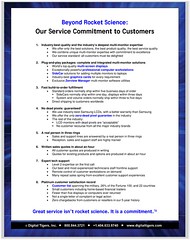
Whats your guarantee
Originally uploaded by iblee....
Is it more complicated than rocket science?
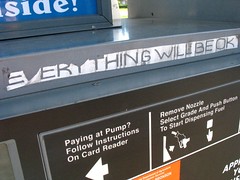
Another thing we can do is rather than let those papers & presentations go to waste hold a library competition for the best use of library resources. Too bad more libraries don't do this.
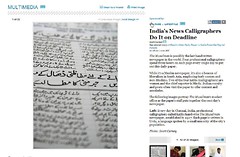
try blogging like this
Originally uploaded by iblee....
Imagine when the interface on our computers allows us to handwrite our blog posts.
That would be cool.
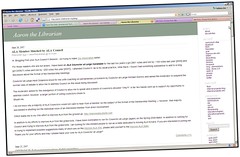
Why should I bother with ALA
Originally uploaded by iblee....
Aaron, tell why I should join ALA and vote you in; because if so many people see you as a changing force, why can't ALA? Is it time to form your own organization for me to join, the progressives?

surf sunday done
Originally uploaded by iblee....
3rd level concept?
As a third level concept (Information Seeking --> Information Retrieval --> Citation Analysis), we will look at citation analysis from the concept of information seeking and information retrieval. Since citations do matter (Baird, 1994) our focus is on the analysis of citations, where citations relate to the cognitive metaphor (CM). Specifically the purpose is looking at: how consistent as a method is citation analysis used in evaluation? While citation analysis seems only remotely interesting, citations are only rising in importance.
No citations will ever be analyzed without first seeking those citations and then, second, retrieving those citations for analysis. This two step process seems obvious but many barriers within libraries exist to make it very hard without first learning a large of amount of implicit navigation. Wayfinding takes on great significance here.
Across the disciplines
Like the study of sub-atomic particles at CERN particle collider in France, the study of citations is done indirectly. Only after a particle collision are relationships exposed; only after publishing an article can a cognitive-metaphor-architecture be found. In looking at the trails these sub-atomic particles leave behind, quantum physicists are learning about hidden relationships of our universe. This same cognitive metaphor holds true for citations. We will see citation analysis (CA) holds reservoirs of metadata --yet to be mined. Information seeking and information retrieval are only becoming more intimately linked to citation analysis.
In looking at the trails these reference particles leave behind, information scientists learn the soft, non-implicit relationships of a citation universe. Therefore the third level (or sub-sub-) concept: is citation analysis, among various types of scholars used consistently across unique, defined disciplines including information science as a method to evaluate scholarly journal articles? Several items need to be determined first.
Cognitive metaphors "Citation 2.0"
Cognitive metaphors seem to dominate the literature for citation analysis. There is talk of citation profiles, document identification elements, cognitive reasoning behind self-citation, purpose behind citing particular articles, and various other elements including problems with citation analysis. Note: there are very few citation elements representing physical substance or "socialness." Think no "Citation 2.0" as of yet.
An example of a citation element representing something physical is a person's name or the name of a place. Another scholar may counter that a person's name stands for a physical person. In reality, though, a person's name is cognitive metaphor representative of their physical nature. The author did not earn his present nickname as being a physical representative from hell with horns (Leecifer) but the fact that the author may mock orthodox religion a bit too much. Something he has changed out of respect for friends. Pseudonyms are great examples of the cognitive metaphor representing the physicality of some thing. Physical metaphors, while not always readily apparent, may offer insights.
Another example is in physical location. Research shows that physical location can have an effect on whether or not an article is valuable for analysis. Note this effect as the person reviewing the article recognizes a physical location, comments on this physicality and selects an embedded citation as an article to read.
A very clear example is most United States information scientists may preferentially select articles from University of California, over articles from the Universidade Federal do Rio de Janeiro. Physical location then serves as a physical metaphor for an information scientist to determine they may better understand the article's information from a same-language author. But, the cognitive metaphor takes precedence in the field of citation analysis.
Now for CA
Is citation analysis (CA) applied consistency across fields of research. The end/means here, as discussed, also looks at the cognitive metaphor, physical metaphor or some aggregation of both to place and to appropriately relate those concepts. CA seems a whirling dervish of mystery at present, not yet fully studied and is more aptly understood as a cognitive metaphor. Socialness is still hidden.
The Review
Qualitative research can be subjective. Qualitative research also belongs in the cognitive metaphor domain. A quantitative analysis would be representative more of a physical metaphor domain. Has enough citation analysis been done to solidify CA as a methodology? Does CA have a dominant paradigm as a guiding model and for that matter with the information explosion in recent years: has there been a paradigm shift? Has the research on CA been done proving its efficacy as qualitative or at least with enough determinacy to be effective in research use?
The scope here was limited to journal articles that reviewed citation analysis as a theory, as a tool uncovering discrete information about consistency across disciplines, and as a cognitive metaphor or physical metaphor. Since citation analysis itself is meaningless out of context and only in the context of determining a particular "x" variable, it is necessary to take this 3-pointed view. The particular "x" variable we are looking at would be, "Citation Analysis as a Tool in Journal Evaluation" (Garfield, 1978) --can CA actually tell scholars something profound?
As stated before, information seeking and retrieval are immediate nuclear family members of citation analysis. While citation analysis is the newest addition in the family, this scholar's information seeking was relegated to literature from various scholarly journal articles. Other publication types (Blogs) were excluded for the purpose of this post. The articles were not necessarily selected because they were directly in the field of Information Science. Rather the information sought and retrieved were articles that dealt with CA. The scholarly journal articles' subject content ranged from history to medical to economic citation analysis. All articles though were focused through the lens of Information Science. Included in this search and retrieval were also various Information Science journals where seminal articles on CA had been published.
Citation Analysis as Cognitive Metaphor:
Citation analysis means 1) looking at a group of writing to understand the impact this writing has on others scholars, and 2) as a prerequisite means that you must understand how to determine this impact through citations. Eugene Garfield, in an unprecedented, 1972 article titled "Citation Analysis as a Tool in Journal Evaluation" set the stage for serious inquiry into the field of CA. While prior research had been done in looking at citations, very little had been done in looking at the impact or cascading effect that citations may have. Garfield's research question was by reviewing citations can one determine what journals matter the most for research purposes.
The grounds for this research was seen as some articles are repeatedly cited and Garfield sought to confirm the hypothesis that this happened time and time again. Drawing the citations from Science Citation Index, Garfield proved a few journals and more specifically, the articles in those journals account for over half of all journal citations. Much research had been carried out on citations preceding Garfield's.
Garfield's research showed what only previous researchers could allude to: the circle of influence for citations is a small compact loop. Garfield effectively tightened what was a loosely held belief. Clinching up the loop, Garfield showed that many articles may tie off a core loop of journals which taken further meant a core loop of articles could be found in any research area. This was done through the methodology of a cognitive metaphor. This metaphor was the now confirmed cognitive structure of citation analysis. Scholars were shown that the majority of research articles are published in a small set of journals. Largely before this scholars were left to guess.
Garfield's article has been cited over 400 times since its publication. Much of the references pointing to Garfield's article make another point about citation analysis. The impact of citations for various reasons was only growing and is not slowing as more of these reasons are exhumed. Garfield reported that we are far from zero-population growth in world of information and are unlikely to ever be there (Garfield, 1972).
Citation analysis was yet to have a consistently used theory though. Leydesdorff states that "citations support the communication of specialist knowledge ...[and]... citation analysis reflects on citation practices" (Leydesdorff, 1998). Leydesdorff reviews many attempts at theories and incursions on citations, citation analysis, and the elements of relational operations that citations create. In short, Leydesdorff furthers a specific, substratic, notion: much information is hidden in citations and can be mined for valuable information. With this research three themes emerge. CA can be viewed from a I) socio-historical analysis, II) quantitative studies with foci of formalization or generalization, and III) policy or management studies who draw upon elements I, or II (Leydesdorff, 1998).
Furthering this thought to build a cognitive metaphor, research on CA must create a long enough continuity with the problem, apply cognitive framework to Information Science, create research projects that span across disciplines, and in the end develop concepts that are put to use (Kuhlthau, 2005). Pierce metaphorically plunges a shovel down into the information science soil to show that Kuhlthau's idea can be explained through CA. Pierce says CA shows information transfer crosses through three methods; borrowing, collaboration, and boundary crossing are these three. With boundary crossing being the most powerful form of information transfer through which CA can be applied, Pierce showed just how dynamic citations can be (Pierce, 1999). The work of Cameron and also Chudnov, Crooker, and Parker state boundary crossing CA is "so enormous and complex that librarians should cooperate to create one outstanding and highly functional database (Cameron, 1997; Pierce, 1999)" unifying the depth and breadth of CA. Case and Higgins in their review of CA find that while CA is used to study how productive scholars are, and unified databases may prove fruitful, what else is there to citation behaviors; what else can CA tell us about the cognitive relationships hidden in citations (Case, 1991; Case & Higgins, 2000)?
There is another way one must look at CA. If CA is being done consistently, (and here we now see consistent to mean the analysis of citations but we do not mean with the same cognitive focus of that analysis), what are the issues? In a series of retrieved articles, "The Use and Misuse of Citation Analysis in Research Evaluation," by Kostoff (1989), "Problems of Citation Analysis: A Critical Review," by MacRoberts and MacRoberts (1998), "A Compendium of Issues for Citation Analysis," by Phelan (1999), all review the consistent lack of attention paid to the problems of CA. MacRoberts and MacRoberts especially state while critics report upon the acknowledgment of the limitations of CA, they find that little work has been done to resolve this: a specific example they note, as this scholar mentioned earlier, is with scholars' names. What happens when a scholar gets married? How do citation analysts account for this seemingly simple and common social phenomenon? MacRoberts and MacRoberts answer, upon reviewing the literature, is that citation analysts cannot (MacRoberts & MacRoberts, 1989).
With, Garfield, CA was only beginning. Another shock-wave peeling back how far the scholars could go into citations analysis came from the explosion of the world wide web. With the birth of the Internet, new questions were raised about citation behaviors and what could be found from CA. In a paper cited 2,240 times, Kleinberg put forth an algorithmic formulation for the extraction of citation data into meaningful information. The articles impact was indubitably not missed. Research into citations, it showed, could be furthered by even more by heuristics that address other cognitive domains nested in citations. A point of interest here is that Kleinberg put as subject descriptors [Information Seeking], [Information Retrieval], tying citation analysis to these particular cognitive domains (Kleinberg, 1999). As for the future state of CA, Perkel (2005) reports that services like google scholar will ultimately mean a much deeper mining of data to include document elements beyond reference lists such as acknowledgments and that a paper like Kleinberg's will only be drawn upon even more for citation analysis (Perkel, 2005).
NOTE: That wasn't the cleanest upload by slideshare -really changed the layout and fonts.
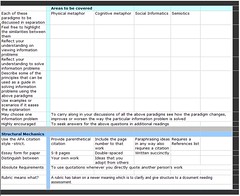
rubric
Originally uploaded by iblee....
A syllabus is important to you because it tells how to do some actions & the unbreakable rules resulting in a final document. You can approach the beginning of any project (think project management, which libraries are not known for) as a required component of the project time line.
Take the typical college paper:
1. Professors weave requirements into a syllabus & you often have to de-construct the document to determine what they are really asking.
2. Any document that asks you to accomplish a task (a report from your boss outlining what she/he wants you do to -in a perfect world right?) should give the requirements in a format allowing you to quickly grasp exact requirements.
You should not have to do something like guessing correctly. You should be able to produce something of compelling interest to the person reading your work.
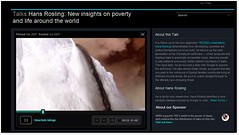
impossible possible
Originally uploaded by iblee....
Here's a possible answer.
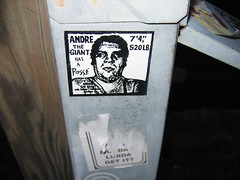
Turn on the p2.0wer. Yes, that was corny.
I need your help. I've been looking but I need to find more ways to help my friend:
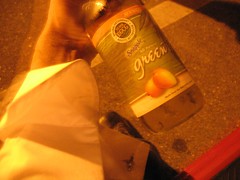
Often the way we share information is about so much more than information. Trite as it may be, it only gets better; even at the worst time, like an IRS audit. Now, to become a millionaire. lmao.
On another note, speaking of information:
"Inspired by a recording of an IBM mainframe computer which Jóhann’s father, Jóhann Gunnarsson, made on a reel-to-reel tape machine more than 30 years ago... incorporated electronics alongside those original tape recordings of the singing computer."
http://www.ausersmanual.com/
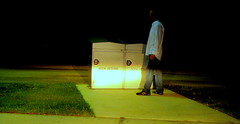
Barbara Stites:
"Would you share this Call for Papers with your colleagues both here in Florida and afar? As the new Editor for Resource Sharing & Information Networks, I am looking for all types of articles relating to Resource Sharing including:
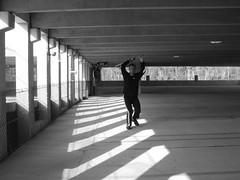
This: not so much; while there is some good stuff to be found within the posts the perspective is skewed.
1. Before you got to "library school" accept that libraries are part of the world of data, information, & knowledge. By the time you get out of school, there could be an entirely new ubiquitous field of information wrangling -could you be the one to figure it out? If you only think of working in a library, then probably not. But, maybe you're going to library school to re-invent libraries because you love them -cool. That's information change.
Opening yourself up to interesting, intriguing, and other "library-type" jobs just may help you view the world from a perspective that gets you a j-o-b -unless you want something more. That's information inspiration. Don't just pay lip service to the work of finding work. People work hard at creating & crafting their careers . It doesn't hurt to be on listservs or to have wise librarian mentors. I owe my greatest work/career fortunes to mentoring librarians. Without their years of experience & guidance, I would not be writing these words.
2. quaere: ask. Ask stupid questions.
Ask questions all the time. Ask why it's important. Ask for whatever to be explained. Ask in a way that makes people open up to you & build upon your ideas. Ask someone to give you the alternative view of the idea they just put forth -because if they say your question is stupid, then they are not listening. Ask why people are think they are above answering basic questions like where the restrooms are. Ask why not. Above all else: never let anyone intimidate you into not asking your question and never let anyone convince you you're stupid because your thought process works completely different from theirs. That's information strategy.
Most people use a decision-making process that factors 1, and at most 2 variables, as they quickly move past any question you put forth. Additionally, there are hidden traps in decision-making. You can learn to make better decisions & asking questions (whether someone else artificially determines that your question holds a depth of stupidity is irrelevant to you) begins the process . Law enforcement individuals would tell you asking questions of all types is at the heart of learning about anything & that any question matters. Maybe it's not that there are dumb questions, but maybe there better people to address such questions. quid bovi.
I remember once solving a problem as Airman Basic in the USAF by asking what happened if this little piece of metal fell off. "Nothing" was the answer and it ended up saving thousands of dollars and tremendous labor hours. Oh, to change the part that lost a tiny piece of metal gearing required large sections of a turbofan engine to be removed to get at it: in the military, time is money and often lives. All because I asked a stupid question about a piece of metal falling off.
3. Read about new ways to work.
Surround yourself with people who rely fascinating ideas to you. That's information compression. Michael & Jenny make you consider ideas in ways you wouldn't normally and ask you continually to apply those ideas to your work/life. Ben and Penelope talk about work as if it's part of your life. Imagine seeing work as something that was removed from your "life." Generations before us used to live this way. Now, how can you possibly separate 40-60-80 hours of your life out & believe your job doesn't affect who you are? Welcome to our time. Your job/work/occupation/ affects who you are; should it define you -maybe, maybe not? But, the old whimsical line about being on your death bed and wishing you hadn't spent more time in the office: is a trifling point that does not matter. Your final act as you die should be to look back upon your life and enjoy it a second time. Work & all.
4. And as the super-smart Rachel says: network.
We live in the time of a great renaissance. And, this slideshare thing is a great way to share your presentations. Sweeeeet.
Just a presentation I did on the mostly intangible elements we build our lives around. In the end, our deeply embedded connections matter the most.
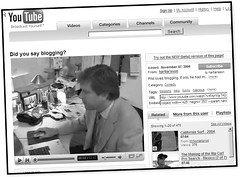
YouTube On Blogging
Originally uploaded by iblee....
Blog, Surf, Youtube, Rinse, Repeat. Found via Brazen Careerist.
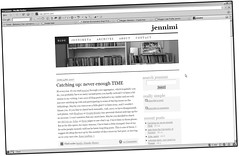
Yes. Yes, it is worth it. And for the record I love made up words.
" iblee, people make mistakes. I once spelled Katie Couric's name wrong on my blog and the very same day a college library I applied to was checking me out (I saw in my stats). I still got the interview.
iblee, people make mistakes. I once spelled Katie Couric's name wrong on my blog and the very same day a college library I applied to was checking me out (I saw in my stats). I still got the interview.
This is one of the things I am often talking about with blogging. We do it, most of us, for free and on our own (meaning no paid editors). We blog because we love what we do and can't wait to share our thoughts and experiences, and in many ways our readers and fellow bloggers are also our peer review and editor. We must be gentle with one another (a friend of mine gently commented with the correct Couric spelling. Ironically, the post was about a Frontline episode addressing the threat of blogs to the traditional newspapers).
At work it's similar. If we have the luxury of working at a library that supports this kind of thing, maybe we have colleagues and committees and teams to work on projects - checking each others' work and giving constructive feedback. But not all of us do and as librarians I hope we can be gentle in finding error. Personally, I want that same kind of treatment in return. I want folks to give me some latitude on a bad day, as I would give them. So I spelled something wrong. End of world?
But anyway... there are bigger things in life than an extra apostrophe. There are a few common mistakes that Word and others just never catch. The beauty of the fact that I am not a robot is just that: I am human. Flesh and bone, mistakes and all. Fragile and strong. And while I may not get everything right all the time, I am passionate about it, and I do it with style. I'll take a flawed poster encouraging students over a nit-picky snarkment any day. And don't get me started on a few of my readers who can't stand my made up words.....
The subject of language as a living breathing evolving organ can be a whole other essay. I've apostrophied on way too long here. :)"
Well said jennimi. I found your comment: prescient and humble. Or preshumblent -for the record, that's my made up word. It means humble while sharing the ability to see things unfold in the future. Like our own future mistakes.
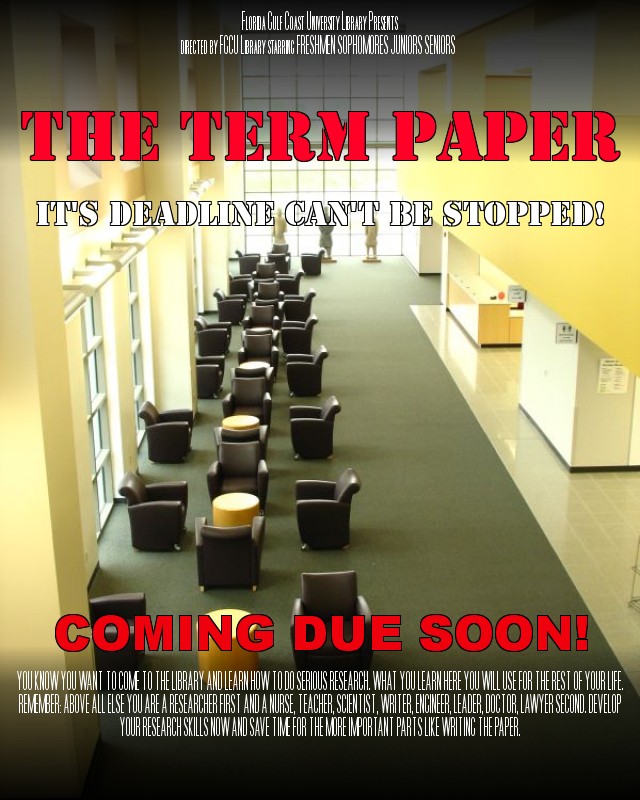
Its :P right on.
What's funny is that I had read this before I chose to start posting mistakes, warts, guffaws, errors, idiocies, bleeps, and all.
Rather than make sure my blog entries are perfect, pictures are perfect, code is perfect, grammar is perfect -I thought: why not just push to get more stuff out of my head and up on the web --share my thoughts --push my creative limits-- be less worried about getting it right and be more worried about getting it done.
"Below average" as a writer accurately describes my writing abilities. I only wrote my first paper (shudder when I call it that) in 1996. Yes, 1996. While 11 years have passed, consistent writing still escapes me. To feel I mastered what I should have learned from grade school & high school in the same time I'm supposed to be writing at the graduate level is a joke --on myself. I'm still learning some basics now.
While I write "for" the graduate level and do a pretty good job, most times it is an arduous struggle to produce a work I am proud of. I had not wrote a single paper in high school, did very little in depth writing in the military (mostly short, bulleted, tech reports.) In fact, the very first paper I wrote in college was, ...hold your breath... 3 pages! And I got a "C" on that paper.
Now it's years later and I realize I'm missing critical writing skills. But, I am slowly picking them up. Being years behind in the basics doesn't make it easy. Working hard to develop my writing I feel the thoughts/ideas in my head & the words I see don't even come close to articulating what I want to say. Then I make mistakes -oh that's just great.
Now you add the horror of people thinking you are less intelligent +your mistakes +lack of ability to articulate +desire to produce thought provoking quality writing +the fact that you don't know most people go through or have gone thru this process and it = performance anxiety, that is, until you face it. The research on reading & writing prove this true.
It's just funny that the week I push myself to experiment more, I get vociferous feedback, indirectly, on a minor mistake. (I shared it for comments to be sure.) Here I am trying: to publish more of my work, to grow professionally, to challenge myself by exposing more of my raw creative process. I post something and the first thing people do, while compliment it, is criticize it. Seems backhanded. I like being criticized; as long as I know it's coming. I'm not opposed to it at all and produce my best work, usually, only after someone totally shreds it.
When you think it's such a horrible error why not contact me directly like one poster on my flickr account did. I found that admirable. And indirect comments show that we have a tendency to do one thing first: find fault. I'm not crying over it. I'm not hurt or sad or remiss. Actually, it's emboldening. I'm quite distant from the happenings & only know about it indirectly.
What I am doing is using this as a writing exercise. There are a lot of reasons but this helps. Sorry if you can't handle a wide swatch of language but: don't stomp on me because you are living in fear. I gave that up a long time ago. I wish to bring civility back, because it's not about the cell phone. I would like to see courtesy, respect, and dialogue, not discussion, rise.
Any and all mistakes are my own.